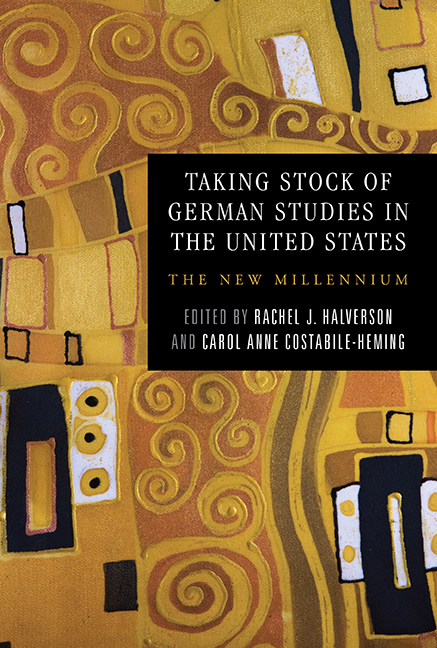3 - Medieval Studies within German Studies: The Nibelungenlied and Hartmann von Aue’s Der arme Heinrich
Published online by Cambridge University Press: 10 June 2021
Summary
Introductory Reflections
THE NUMBER OF SCHOLARS specializing in medieval German literature at higher education institutions in North America is shrinking, as is the general support for positions in that field. Increasingly, it seems, administrators believe that the only way to secure German studies as a discipline in North America (and in other parts of the world) lies in the areas of modern and postmodern approaches, such as film studies, Migrationsliteratur (literature by immigrants), and perhaps, still tolerated, Weimar literature as being the earliest acceptable literary period of perceived relevance for our present student generation. The flagship journal in German studies, the German Quarterly, reflects this ongoing trend to the detriment of all periods prior to 1945. As a medievalist, however, who has been able to attract surprisingly large numbers of students to his classes on every level in the Department of German Studies at the University of Arizona over the last twenty-five years, I believe that medieval studies is not a dead subject, and that courses on medieval German literature at the university level can certainly meet, if not exceed, students’ general expectations of attractive and meaningful classes in any German studies department at a North American university offering a BA or an MA degree.
As far as anecdotal data confirm, the interest in medieval literature is rising at universities in German-speaking countries, as demonstrated by a growing number of Medieval Studies Centers (Bamberg, Greifswald, Salzburg, Zurich, etc.). The situation on this side of the Atlantic may not be as rosy, but there is no reason to despair either, as long as we approach our subject matter appropriately and sensitively considering the cultural conditions at a North American university, the needs of the students and the administration, and the expectations of the public. I will illustrate this, after some reflections on pedagogical and philosophical issues pertaining to the relevance of the Middle Ages, by way of analyzing the Middle High German heroic epic the Nibelungenlied (Nibelungen Song) and Hartmann von Aue's religious verse narrative Der arme Heinrich (Poor Heinrich). Both are canonical texts of German literature, and both continue to be of importance for any reader today interested in the premodern world, as I can confirm based on many classroom experiences.
- Type
- Chapter
- Information
- Taking Stock of German Studies in the United StatesThe New Millennium, pp. 52 - 68Publisher: Boydell & BrewerPrint publication year: 2015
- 1
- Cited by



